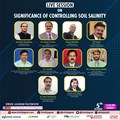
World Soil Day is celebrated every year on 5th December to spread awareness about the importance of healthy soil and to advocate for the sustainable management of the soil resource.
In order to celebrate the same, Krishi Jagran organized a webinar on “Significance of Controlling Soil Salinity” on 5th December at 12 noon on Zoom. Various dignitaries from across the industry will be sharing their thoughts on the same. The webinar was streamed live on the official Facebook Page of Krishi Jagran.
The session started with a progressive farmer, Ravindra Chaudhary from Dhewal, Madhya Pradesh who told us that he cultivates Soyabean, Maize, Wheat, Potatoes, Onions & even Garlic. Representing all the farmers of Madhya Pradesh, he said “The farmers of the state are very progressive and cultivate multiple crops with integration of allied activities like fish farming and animal husbandry”.
He also said that he is looking forward to this webinar where experts from the field will help the farmers like him by sharing their valuable knowledge on managing the salinity problem in soil.
Dr A.K. Rai, Principal Scientist (Soil Science), ICAR- Central Soil Salinity Research Institute, Karnal Haryana was one of the esteemed panelists in this webinar. He shared some very important information for the farmers.
He said "Soil salinity is a big problem that directly affects the land productivity."
The easiest way to identify saline soil is by a white-colored layer formed over the soil, but that way we won’t be able to identify the hidden salinity in the soil and such a soil (with hidden Salinity ) is more dangerous. Formation of empty paddy pods are a characteristic of this soil
In such a situation, farmers will bear massive losses. Dr. A.K. Rai, requested the farmers who are facing this problem to visit their nearest KVK and get their soil tested for salinity.
He stated that “If all the degraded land in India is reclaimed, we could produce approximately 11-12 MT more produce.”
















